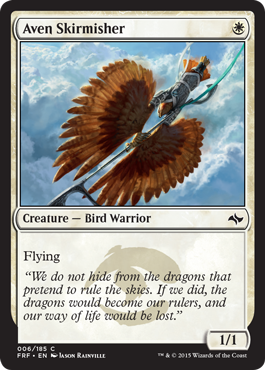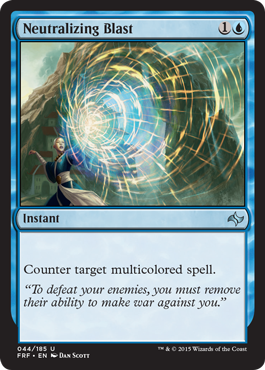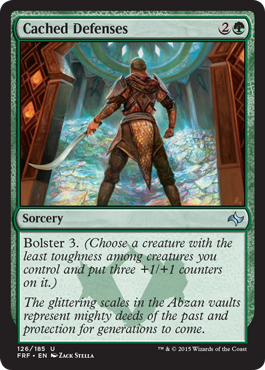Are you a Quiet Speculation member?
If not, now is a perfect time to join up! Our powerful tools, breaking-news analysis, and exclusive Discord channel will make sure you stay up to date and ahead of the curve.
We've all had it happen: you sit down for a game, wish your opponent luck, and shuffle up. On his first turn, he slams a Plains followed by this guy:
Personally, I do a little mental fist pump and then go on with the game as if my opponent played a real card, doing everything I can not to indicate that he should definitely be sideboarding that nonsense out at the end of the game. But especially at a prerelease, I'm not sure this is the best way to be friendly to new players and be an ambassador of the game.
And I do think that all experienced players should be ambassadors of the game at prereleases (and other events, but especially prereleases). This doesn't mean you have to go easy on your opponents, and it certainly doesn't mean you shouldn't play to win. But maybe turning off the normal poker face that many experienced players revert to and trying a friendly, outgoing approach is the way to go at these mostly casual events.
That still doesn't answer my initial question, though: how do you deal with an opponent who plays a bad card? On one hand, as ambassadors of the game, we should be jumping in and helping our opponents not to make easy-to-avoid mistakes like that. On the other hand, sometimes people don't take unsolicited advice well.
I mean, it is kind of a jerk move to tell someone that his deck is horrible and the cards in it are all bad. Obviously you want to have a little more tact, but even with the best of intentions, people might be offended if you try to preach at them when they're just trying to have a good time.
I'm not really sure how to handle this. The fact is, I've had many people outright ask me for advice, only to argue with every point I tried to make. Some players don't care to get better, and some already think they're the best in the room (as a rule, these players are decidedly not the best in the room).
There's one thing I will never do: encourage a player to make a change to his deck in between games of our match. Sorry, I'm all about being an MTG ambassador, but if I am going to take the step to offer advice, I'll do it after I've dispatched my opponent, thank you.
But past that caveat, I'm legitimately unsure whether we should be butting in with our opinions on which cards are good and which cards are not, or if we should just keep quiet until asked. Realistically, every situation is different, and you'll need to read your opponent's demeanor to get a sense of whether you should speak up.
But in general, what do you think? Should an obviously new player be given unsolicited advice when he's doing something wrong? Or is it better to mind your own business until you're asked? Let me know how you'll handle these situations at your prerelease this weekend.








1/1 with evasion for 1? I see nothing wrong with that curve
Marshall Sutcliffe and LSV both gave it an “F” rating in their limited set reviews.
“we are borg resistance is futile”
Agreed with you. I guess we are not “cool”…
Very disappointing post and don’t know how is this relevant to mtg finance.
Yeah, I’d rather just drop a goblin rabblemaster on turn one like your thinking.
Them noobs.
I don’t think unsolicited advice is always bad but if given should be done very sparingly. Some players can help a less experienced limited player in an uplifting way and others can be aggravating. It is all about how much the inexperienced player wants to learn at that time and being able to read the situation.
So I give out lots of advice at prereleases, especially since it seems to bring the new players or casual players out of the woodwork. I have found an excellent way to offer advice. It may seem obvious, but especially if you see the player playing some actual trash cards in their limited deck just strike up a conversation about their experience in magic. Basically no one is offended if you just start a conversation with questions like: “Do you come to this store a lot?”, “What do you think of the new set?”, “How long have you been playing Magic?” (<-Avoid leading with this though because it may come across as condescending depending on contex.) Eventually a new player will admit that they are new and then just start talking about how they like the new cards, the limited format, etc. It makes it very easy to offer to look through their deck and give advice after the game.
Anyway I just wanted to share since this is my second favorite part of prereleases (besides all the new cards). I completely agree with your ideas about being an ambassador of the game and even relatively experienced players with less experience in limited may end up asking for help if you approach in this way.
I wish you had actually bothered to find a genuine “unplayable” as your main example (it’s not like they are uncommon) since in the right style of sealed deck (low curve, evasive, ways to boost creatures like equipment/auras/bolster) a flying man/suntail hawk is an actual card (also an actual card when compared to going into an extra colour unnecessarily).
That said I do pretty much the same thing, I play the match as is and then I ask how long my opponent has played, offer to show them my deck and ask to see their’s giving them a few pointers about cards that should be cut (and an explanation about why).
If I play against an obviously inexperienced player, I’ll win from him. And afterwards I’ll ask if I can see his deck, talk to him about how the game went and ask him if I can make some suggestions. Then take out the cards that are the worst in his deck and tell them “this card isn’t as good as you thought, because of this and this reason. You might think thing A, but that will almost never happen…etc”. Something like that. Not saying “you are a bad player”, but “here is some information you might not know”.
After that, I suggest he replace some of them and usually I ask if he/she wants my help with a little rebuild. Nobody says no, they come for fun but they also want to win. So why say no to somebody who obviously knows what he’s talking about?
Also, I always talk in terms like “I would play this card instead of what you picked for this or this reason”. Not saying “you are stupid not to play this” or “you must play this”. They don’t have to do anything. Well, except having a good time :).
TLDR: I make suggestions and tell them why I think I would do that. And ask them if they want my help. If they argue, I counterargue friendly and then say “I’m just giving tips that will make your deck better, please play what you makes you happy”.
I remember a guy at a Conspiracy draft who insisted on playing the 3 Cinder Walls he picked after I told him that didn’t fit the rest of his deck. Later he came to me and said that I was right and they were not good, but he just liked Walls so much and still had a blast. Not everybody plays to win :).
As someone who doesn’t play limited much: I like the comments, but one thing is noticed that people sometimes just say that you shouldn’t play a card without elaborating on why that is. If you do comment on someone’s choices, make sure to explain why those specific cards aren’t good choices (and make suggestions for what to replace them with).
This happened a lot with M15 draft in my area. For some reason, people really wanted to live the dream with Ornithopter. I always told them I’d rather have a land.
After reading this and the comments. I think I am done with this site. What a bunch of douchebags. You NEED the win so bad that you wait until after you “win from them” to try and help them.
When I was getting back into the game I was helped mid game by someone, and it’s acts like that that build a community, and keeps people coming back to support that store, and the game.
The competitive aspect of the game can seem unpleasant at times but also offers a lot to enjoy if one can acquire a taste for it. A good model for competitive but not “douchebaggy” would be LSV, who wins at the highest levels of the game but overall is a sociable and well-mannered guy and is seen as a positive influence on the game. Giving your opponent tips that might help him beat you has its place in some settings but in a tournament with a cash buy-in and substantial prizes based on one’s win percentage, I think we should cut people some slack if they choose not to share that info with an opponent.
You don’t know how relieved I am to finally see someone threaten to leave this site forever and it’s not because of one of my articles.
Also, there is nothing douchebaggy about waiting until the round is over to help someone. I have suggested better cards from their sideboard, given feedback about cards they chose to play that were overrated and rebuilt my opponents’ decks at limited events You can’t really think that makes me a douchebag because I did it after game 2 rather than game 1.
Also, QS readers are among the least spikey people on the planet. There’s no way we’re so spikey that it turned your stomach.
I don’t completely disagree Frank, but let’s be realistic. If you’re paying money to play a game, with the possibility of earning something in return, in a cold, logical sense, you’re not putting forth money for your opponent to win. Improving your opponents chances of allowing you to pay for someone else’s prizes that night seems counter intuitive.
AFTER you beat them though, you want your tie breaks to be better. = )
I believe you should almost never give out unsolicited advice. If you REALLY feel like telling them, always start with “would you mind if I look at your other cards?” If there’s something good like a valuable mythic, tell them that the card is awesome. After that, ask them if they are fine with suggestions. If they’re okay with that, you should start small by swapping out one to three worst cards for solid creatures in their sideboard, and explain briefly why those cards do very little, while you can’t go too wrong with creatures that have reasonable stats. Don’t do an overhaul on their whole deck – the worst thing that could happen to a new player is to have every card that they handpicked taken out of their deck and be forced in a different direction. This can easily ruin an otherwise fun experience for them and make them lose interest in Magic. Remember how you learned Magic yourself: it can take years for someone to develop a firm grasp on the concepts of tempo, card advantage, and effective deck building.
I just wanted to drop in and say that I played you are bad card and it won me several games over the course of the pre release. many times I just had to keep my opponent’s board clear of threat and keep swinging with my 1/1 flier. one game in particular he did 16 points of damage!
My process is that I finish the match and then ask the opponent if he would like to go over his deck and his sidebopard and then advise on what cards are good in the sideboard and which are bad.
If he wants to argue the point regarding a card then I will always back down. Sometimes you just have to make your own experience with bad cards. All you can do is offer advice on a deck and let them do the rest.
The trap here is that one advises on stereotypes that do not turn out to be true. At a Prerelease someone was watching my game and told me that mad cap skills was a bad card because it was an enchantment and invites a two for one. My reply was that I do not mind taking a two for one if I get in for 8 damage by playing this on turn 2 and forcing a removal spell on a one cc creature.
New Players should be allowed to make their own experience and that includes being horrible at magic in the beginning. It is ultimately part of the magic experience. Offer advice, but don’t tell him what to do. At the end of the day it is just a game and we should enjoy it.
First things first: I play the game until the end and try not to give any hint during the match.
After that, I try my best to help my opponent to improve his deck. After all, I won’t face him/her again and that might improve my statistics for the tie breakers.
That happened yesterday. My opponent in the 1st round ended up bettter ranked than me and got a nice reward. I’ve got a better reward than if I just left him alone with the misbuilt deck.
Of course, I tried my best to be gentle and prove my point about the changes I made.
Result: He owes me a beer now =D